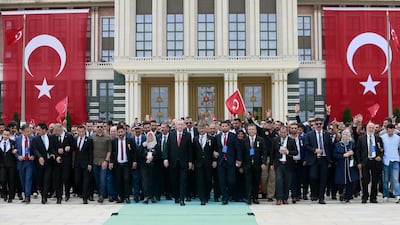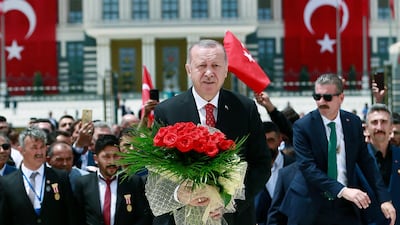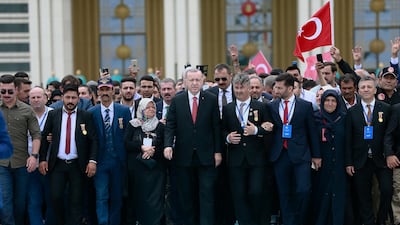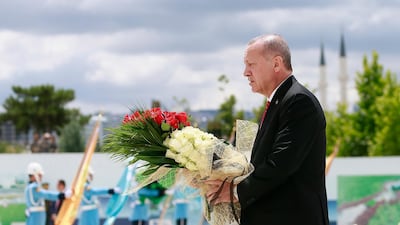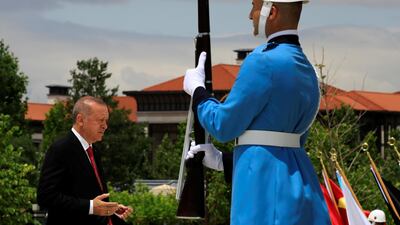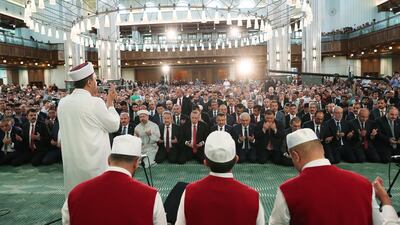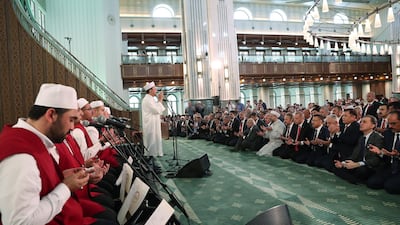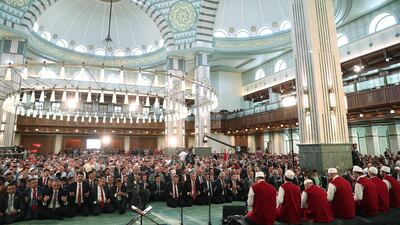As Turkey marks the third anniversary of a deadly coup attempt, the government has mounted a worldwide public relations drive to promote its narrative to a sceptical foreign audience.
Since the failed putsch on July 15, 2016, Turkey has struggled to convince many allies, particularly in the West, about what happened and who was responsible for trying to topple the government.
Ankara says a movement led by US-based cleric Fethullah Gulen – which it has labelled the Fethullahist Terrorist Organisation, or Feto – was behind the attempt that led to the deaths of at least 251 people.
However, the government has found it difficult to explain how a group that portrays itself as an education-focused movement promoting interfaith dialogue and peace could infiltrate so many aspects of the Turkish state, including the military, and carry out such a bloody bid for power.
The failure to extradite Mr Gulen, who lives in a rural compound in Pennsylvania and denies any role in the coup attempt, has been a cause of tension with Washington in recent years, with the US arguing that Turkey has not produced enough evidence to warrant extradition.

In 2017, the European Union’s counter-terrorism coordinator, also citing a lack of evidence, said the EU did not consider Feto to be a terrorist organisation. The head of Germany’s intelligence agency also dismissed Ankara’s claims that Mr Gulen was behind the coup attempt.
The purge of suspected Gulenists within Turkey has led to international concerns about human rights abuses and has seen other high-profile extradition attempts, such as that of businessman Akin Ipek in London earlier this year, fail.
In the days leading up to the anniversary, the Turkish government and state-run media have promoted a series of documentaries and videos in English and other languages to push its interpretation of the attempted coup.
President Recep Tayyip Erdogan's communications team released short videos entitled This Homeland Belongs To Us; The Will Belongs To Us in six languages. Set against dramatic music, the video outlines the events that took place on the night of the coup.
The government also revealed a new logo to mark the coup, which incorporates the crescent and star of the Turkish flag. July 15 has been marked as Democracy and National Unity Day – joining other days of national commemoration.
The foreign language videos have been promoted by Turkish embassies around the world on social media and events have been held in foreign capitals to promote them.
In London, Turkish ambassador Umit Yalcin hosted the screening of a film on the Gulenist movement documenting how the group became established in the US.
Mr Yalcin told the audience that although Turkey was working to combat Feto “they are still active abroad and in different countries and, unfortunately, many of them are our partners and allies who show them tolerance and protection”.
TRT World, the English language channel of Turkey’s state broadcaster, has also produced a documentary on the Gulenist group in time for the anniversary.
Andrew Hopkins, the channel's diplomatic correspondent, helped make the documentary, entitled Until We Take Control.

"In this documentary we have brought together a lot of the information, a lot of the footage that's out there in the public domain in Turkey but is not necessarily so freely available out there in the English language media around the world," he told TRT World.
Ceren Kenar, a Turkish journalist who advised on the film, said: "It is normal that this whole organisation is quite difficult to understand for non-Turkish people … we are talking about an extremely complex, an extremely well-structured as well as insidious criminal network."
Other strands of the PR drive have included mobile billboards commemorating the coup pass through Manhattan's Times Square and a panel discussion in Washington arranged by Ankara's presidential communications team.
In Turkey, streets were decorated with the national flag and two museums on the coup attempt were due to be opened in Ankara and Istanbul.
The national railway company launched a service between the two cities emblazoned with the message “15 July Victory of Democracy”.
“It is good that we commemorate the martyrs who gave their lives to protect their country and democracy,” said Haruk Guvenc, who runs the 15 July cafe in Ankara, located a few minutes’ walk from the Turkish parliament, which was bombed by rogue pilots on the night of the coup attempt.
"The Americans and English should understand what happened ... instead of criticising Turkey all the time."
Many Turks believe the coup was engineered by foreign powers, with the US being the most popular to blame – a view reinforced by the failure to extradite Mr Gulen.
Sensitivity to such charges has reportedly led the US to delay a sanctions announcement about Turkey's buying of Russian S-400 missiles until after Monday's anniversary.
